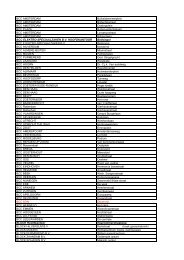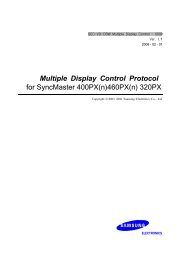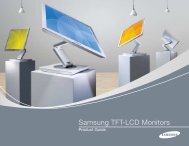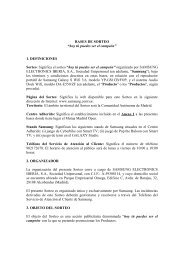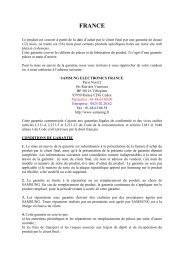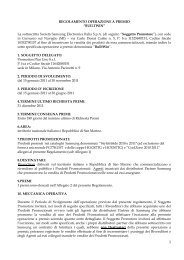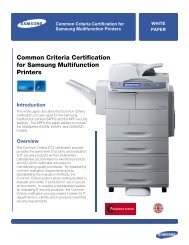2 / Samsung Electronics Sustainability Report 2012 /
2 / Samsung Electronics Sustainability Report 2012 /
2 / Samsung Electronics Sustainability Report 2012 /
Create successful ePaper yourself
Turn your PDF publications into a flip-book with our unique Google optimized e-Paper software.
Waste Management<br />
Achieving 100% recycling of all waste is the ultimate goal of <strong>Samsung</strong> <strong>Electronics</strong>’ waste management policy. Additionally, we are working towards<br />
achieving the target by expanding the types of waste recycled. In 2011, we began recycling and utilizing of waste glass, waste plastics, and organic<br />
sludge which were incinerated or landfi lled in the past. We have set a mid-term target of achieving a 95% waste recycling rate and to establish a recycling-oriented<br />
waste management system to achieve minimization in waste generation.<br />
In addition to increasing our recycling rate, <strong>Samsung</strong> <strong>Electronics</strong> is striving to reduce waste generation. We have also set an annual waste reduction target<br />
of 10% each year until to 2015. In 2011, the volume of waste generated has increased by 7%. However, the volume of waste per unit of production<br />
has remained same level to previous years. Increase in production volume and scrap generated from replacement of old production facilities are contributing<br />
to an increase in waste generated. However, we are making various efforts including reduction and reuse of packaging for parts and reduction<br />
in paper use to achieve an overall reduction in waste generation. Additionally, <strong>Samsung</strong> <strong>Electronics</strong> is closely monitoring waste processing companies<br />
by making site visits and checking terminal processing of the waste to prevent illegal processing and illegal shipping of waste over national borders.<br />
Waste Generated and Recycling Rate (Korea)<br />
Generated (ton) Recycled (ton) Waste generation per unit production<br />
(ton/KRW 100 milion)<br />
0.52<br />
466,941<br />
427,412<br />
2009<br />
92%<br />
520,917<br />
489,492<br />
2010<br />
Waste generation per unit production: Total waste generation ÷ sales (Korea or Global)<br />
32 / <strong>Samsung</strong> <strong>Electronics</strong> <strong>Sustainability</strong> <strong>Report</strong> <strong>2012</strong> /<br />
0.46 0.43<br />
524,387<br />
490,123<br />
2011<br />
Waste Generated and Recycling Rate (Global)<br />
Generated (ton) Recycled (ton) Waste generation per unit production<br />
(ton/KRW 100 milion)<br />
663,152<br />
604,266<br />
94% 94% 91%<br />
0.43 0.43<br />
2010<br />
711,871<br />
645,942<br />
Waste Type and Processing Methods (tons)<br />
2% 2%<br />
4% 7%<br />
Korea<br />
Recycling 490,123<br />
Landfi lled (off site) 22,009<br />
Incinerated (off site) 12,255<br />
Total 524,387<br />
2011<br />
91%<br />
94% 91%<br />
Global<br />
Recycling 645,942<br />
Landfi lled (off site) 49,143<br />
Incinerated (off site) 16,786<br />
Total 711,871



